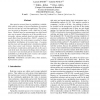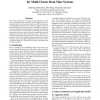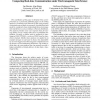126
click to vote
ECRTS
2004
IEEE
15 years 5 months ago
2004
IEEE
Many real-time systems need to maintain fresh views which are derived from shared data that are distributed among multiple sites. When a base data item changes, all derived views ...
113
click to vote
ECRTS
2004
IEEE
15 years 5 months ago
2004
IEEE
We present a task model for adaptive real-time tasks in which a task's execution rate requirements are allowed to change at any time. The model, variable rate execution (VRE)...
123
click to vote
ECRTS
2004
IEEE
15 years 5 months ago
2004
IEEE
Computing systems, ranging from small battery-operated embedded systems to more complex general purpose systems, are designed to satisfy various computation demands in some accept...
119
click to vote
ECRTS
2004
IEEE
15 years 5 months ago
2004
IEEE
Most previous research done in probabilistic schedulability analysis assumes a known distribution of execution times for each task of a real-time application. This is however not ...
121
click to vote
ECRTS
2004
IEEE
15 years 5 months ago
2004
IEEE
Control methods are being used increasingly for uncertainty management and QoS in modern web server systems. Previous approaches have suggested combined feedforward and feedback c...
127
click to vote
ECRTS
2004
IEEE
15 years 5 months ago
2004
IEEE
This paper targets energy-efficient scheduling of tasks over multiple processors, where tasks share a common deadline. Distinct from many research results on heuristics-based ener...
131
click to vote
ECRTS
2004
IEEE
15 years 5 months ago
2004
IEEE
We present an approach to partitioning and mapping for multicluster embedded systems consisting of time-triggered and eventtriggered clusters, interconnected via gateways. We have...
138
click to vote
ECRTS
2004
IEEE
15 years 5 months ago
2004
IEEE
A common method for dealing with overload conditions in periodic task systems is to reduce the load by enlarging activation periods. When a periodic task implements a digital cont...
129
click to vote
ECRTS
2004
IEEE
15 years 5 months ago
2004
IEEE
The problem of feasibility analysis for asynchronous periodic task sets (i.e. where tasks can have an initial offset) is known to be co-NP-complete in the strong sense. A sufficie...
123
click to vote
ECRTS
2004
IEEE
15 years 5 months ago
2004
IEEE
The contribution of this paper is threefold. First, an improvement to a previously published paper on the timing analysis of Controller Area Network (CAN) in the presence of trans...



